Legal Advice: Employment Law and Cancer Diagnosis in the UK
VerifiedAdded on 2023/02/01
|11
|3347
|20
Report
AI Summary
This report provides legal advice to a company director, Alex, regarding an employee, James, who is undergoing medical tests with a suspicion of cancer. It analyzes relevant UK employment laws, particularly the Equality Act 2010, and its implications for disability discrimination. The report explains the definition of disability, including cancer, and discusses the employer's obligations, such as making reasonable adjustments. It examines case law, including Lofty v. Hamis and Gallop v Newport City Council, to illustrate legal precedents. The report offers practical solutions, such as considering early retirement options and the provision of ill-health retirement pensions, while addressing potential financial burdens on the company. It also highlights the importance of gathering evidence for decisions and the risks of indirect disability discrimination. The report emphasizes the need for a compassionate approach while adhering to legal requirements, providing a balanced perspective on managing the employee's situation while protecting the company's interests.
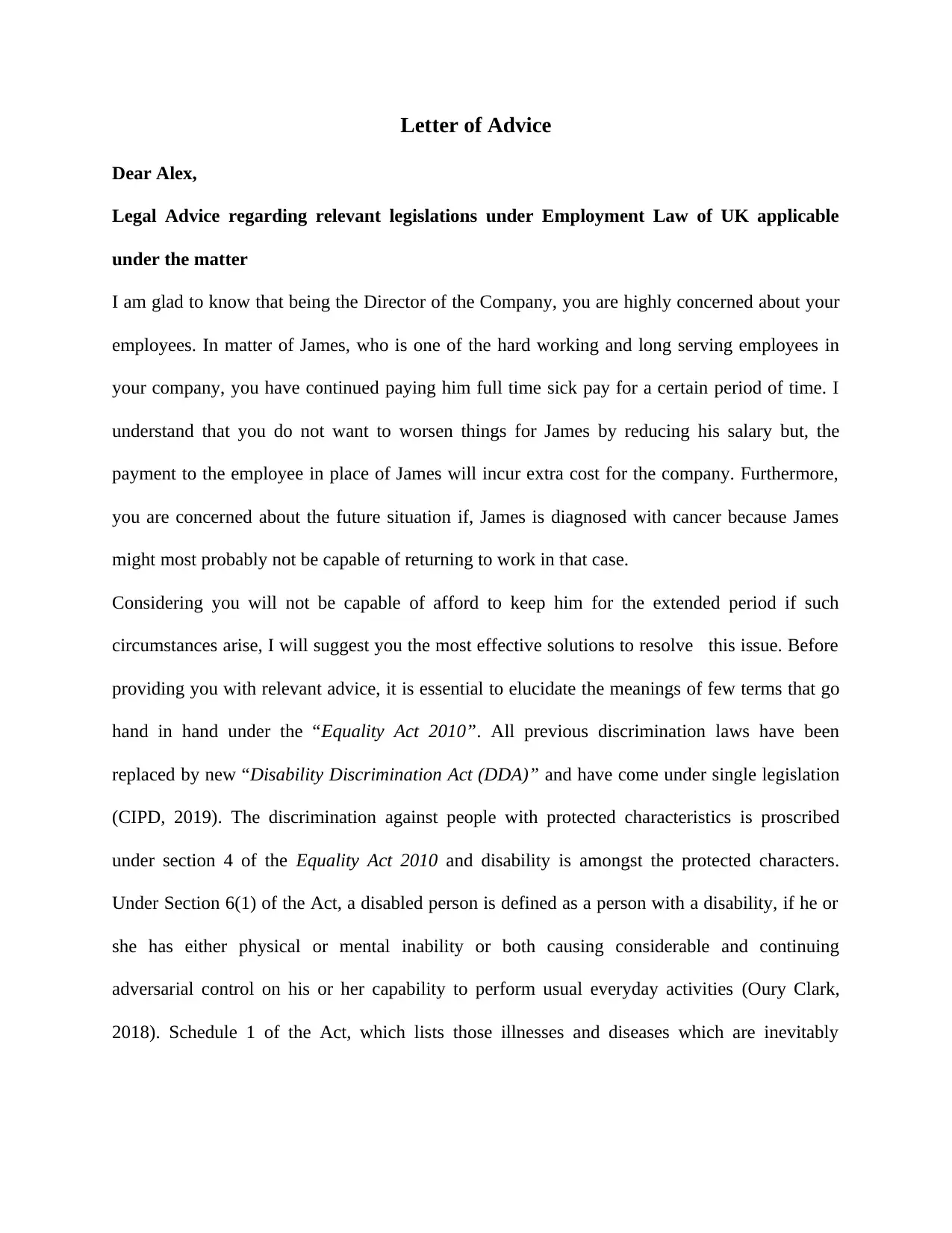
Letter of Advice
Dear Alex,
Legal Advice regarding relevant legislations under Employment Law of UK applicable
under the matter
I am glad to know that being the Director of the Company, you are highly concerned about your
employees. In matter of James, who is one of the hard working and long serving employees in
your company, you have continued paying him full time sick pay for a certain period of time. I
understand that you do not want to worsen things for James by reducing his salary but, the
payment to the employee in place of James will incur extra cost for the company. Furthermore,
you are concerned about the future situation if, James is diagnosed with cancer because James
might most probably not be capable of returning to work in that case.
Considering you will not be capable of afford to keep him for the extended period if such
circumstances arise, I will suggest you the most effective solutions to resolve this issue. Before
providing you with relevant advice, it is essential to elucidate the meanings of few terms that go
hand in hand under the “Equality Act 2010”. All previous discrimination laws have been
replaced by new “Disability Discrimination Act (DDA)” and have come under single legislation
(CIPD, 2019). The discrimination against people with protected characteristics is proscribed
under section 4 of the Equality Act 2010 and disability is amongst the protected characters.
Under Section 6(1) of the Act, a disabled person is defined as a person with a disability, if he or
she has either physical or mental inability or both causing considerable and continuing
adversarial control on his or her capability to perform usual everyday activities (Oury Clark,
2018). Schedule 1 of the Act, which lists those illnesses and diseases which are inevitably
Dear Alex,
Legal Advice regarding relevant legislations under Employment Law of UK applicable
under the matter
I am glad to know that being the Director of the Company, you are highly concerned about your
employees. In matter of James, who is one of the hard working and long serving employees in
your company, you have continued paying him full time sick pay for a certain period of time. I
understand that you do not want to worsen things for James by reducing his salary but, the
payment to the employee in place of James will incur extra cost for the company. Furthermore,
you are concerned about the future situation if, James is diagnosed with cancer because James
might most probably not be capable of returning to work in that case.
Considering you will not be capable of afford to keep him for the extended period if such
circumstances arise, I will suggest you the most effective solutions to resolve this issue. Before
providing you with relevant advice, it is essential to elucidate the meanings of few terms that go
hand in hand under the “Equality Act 2010”. All previous discrimination laws have been
replaced by new “Disability Discrimination Act (DDA)” and have come under single legislation
(CIPD, 2019). The discrimination against people with protected characteristics is proscribed
under section 4 of the Equality Act 2010 and disability is amongst the protected characters.
Under Section 6(1) of the Act, a disabled person is defined as a person with a disability, if he or
she has either physical or mental inability or both causing considerable and continuing
adversarial control on his or her capability to perform usual everyday activities (Oury Clark,
2018). Schedule 1 of the Act, which lists those illnesses and diseases which are inevitably
Paraphrase This Document
Need a fresh take? Get an instant paraphrase of this document with our AI Paraphraser
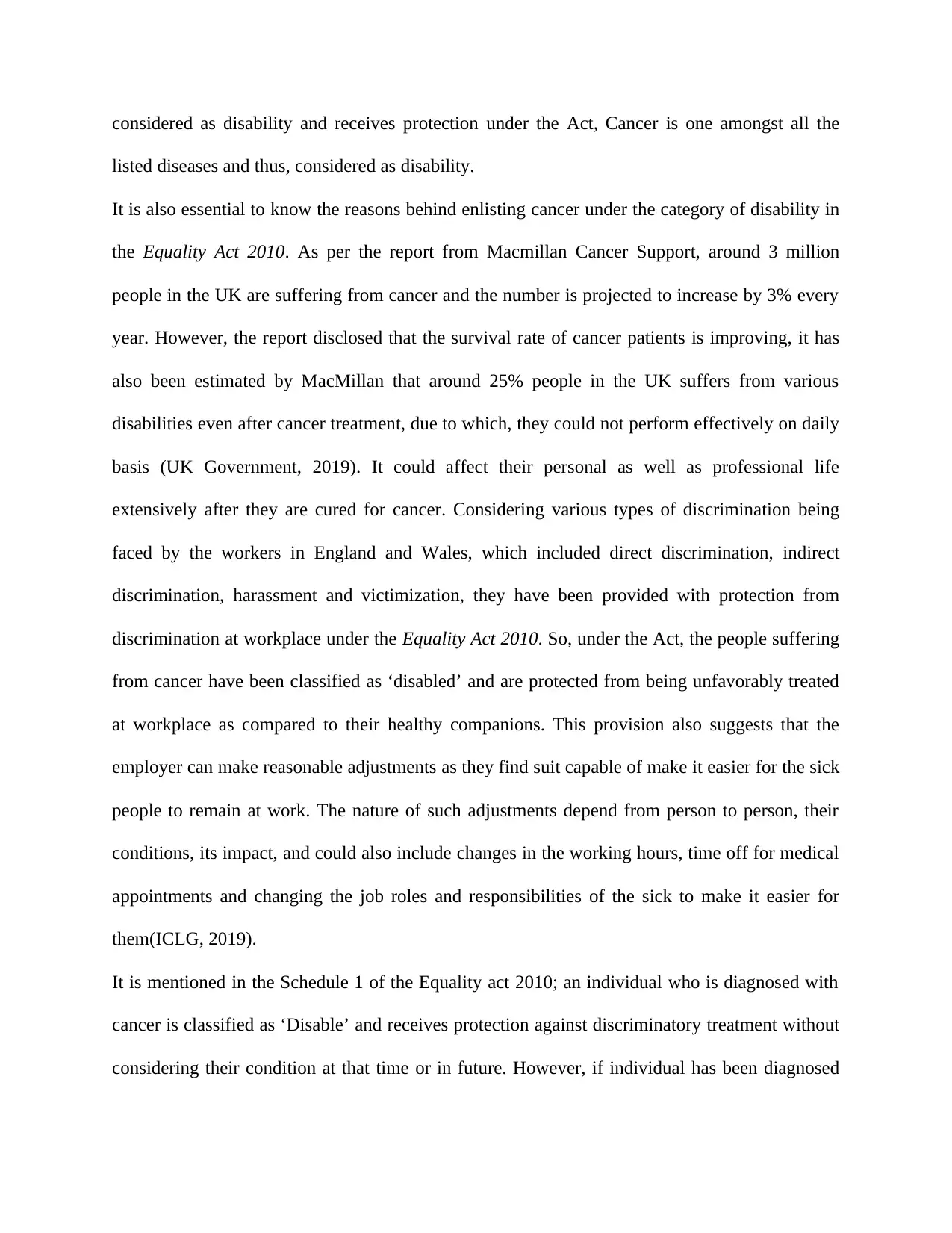
considered as disability and receives protection under the Act, Cancer is one amongst all the
listed diseases and thus, considered as disability.
It is also essential to know the reasons behind enlisting cancer under the category of disability in
the Equality Act 2010. As per the report from Macmillan Cancer Support, around 3 million
people in the UK are suffering from cancer and the number is projected to increase by 3% every
year. However, the report disclosed that the survival rate of cancer patients is improving, it has
also been estimated by MacMillan that around 25% people in the UK suffers from various
disabilities even after cancer treatment, due to which, they could not perform effectively on daily
basis (UK Government, 2019). It could affect their personal as well as professional life
extensively after they are cured for cancer. Considering various types of discrimination being
faced by the workers in England and Wales, which included direct discrimination, indirect
discrimination, harassment and victimization, they have been provided with protection from
discrimination at workplace under the Equality Act 2010. So, under the Act, the people suffering
from cancer have been classified as ‘disabled’ and are protected from being unfavorably treated
at workplace as compared to their healthy companions. This provision also suggests that the
employer can make reasonable adjustments as they find suit capable of make it easier for the sick
people to remain at work. The nature of such adjustments depend from person to person, their
conditions, its impact, and could also include changes in the working hours, time off for medical
appointments and changing the job roles and responsibilities of the sick to make it easier for
them(ICLG, 2019).
It is mentioned in the Schedule 1 of the Equality act 2010; an individual who is diagnosed with
cancer is classified as ‘Disable’ and receives protection against discriminatory treatment without
considering their condition at that time or in future. However, if individual has been diagnosed
listed diseases and thus, considered as disability.
It is also essential to know the reasons behind enlisting cancer under the category of disability in
the Equality Act 2010. As per the report from Macmillan Cancer Support, around 3 million
people in the UK are suffering from cancer and the number is projected to increase by 3% every
year. However, the report disclosed that the survival rate of cancer patients is improving, it has
also been estimated by MacMillan that around 25% people in the UK suffers from various
disabilities even after cancer treatment, due to which, they could not perform effectively on daily
basis (UK Government, 2019). It could affect their personal as well as professional life
extensively after they are cured for cancer. Considering various types of discrimination being
faced by the workers in England and Wales, which included direct discrimination, indirect
discrimination, harassment and victimization, they have been provided with protection from
discrimination at workplace under the Equality Act 2010. So, under the Act, the people suffering
from cancer have been classified as ‘disabled’ and are protected from being unfavorably treated
at workplace as compared to their healthy companions. This provision also suggests that the
employer can make reasonable adjustments as they find suit capable of make it easier for the sick
people to remain at work. The nature of such adjustments depend from person to person, their
conditions, its impact, and could also include changes in the working hours, time off for medical
appointments and changing the job roles and responsibilities of the sick to make it easier for
them(ICLG, 2019).
It is mentioned in the Schedule 1 of the Equality act 2010; an individual who is diagnosed with
cancer is classified as ‘Disable’ and receives protection against discriminatory treatment without
considering their condition at that time or in future. However, if individual has been diagnosed
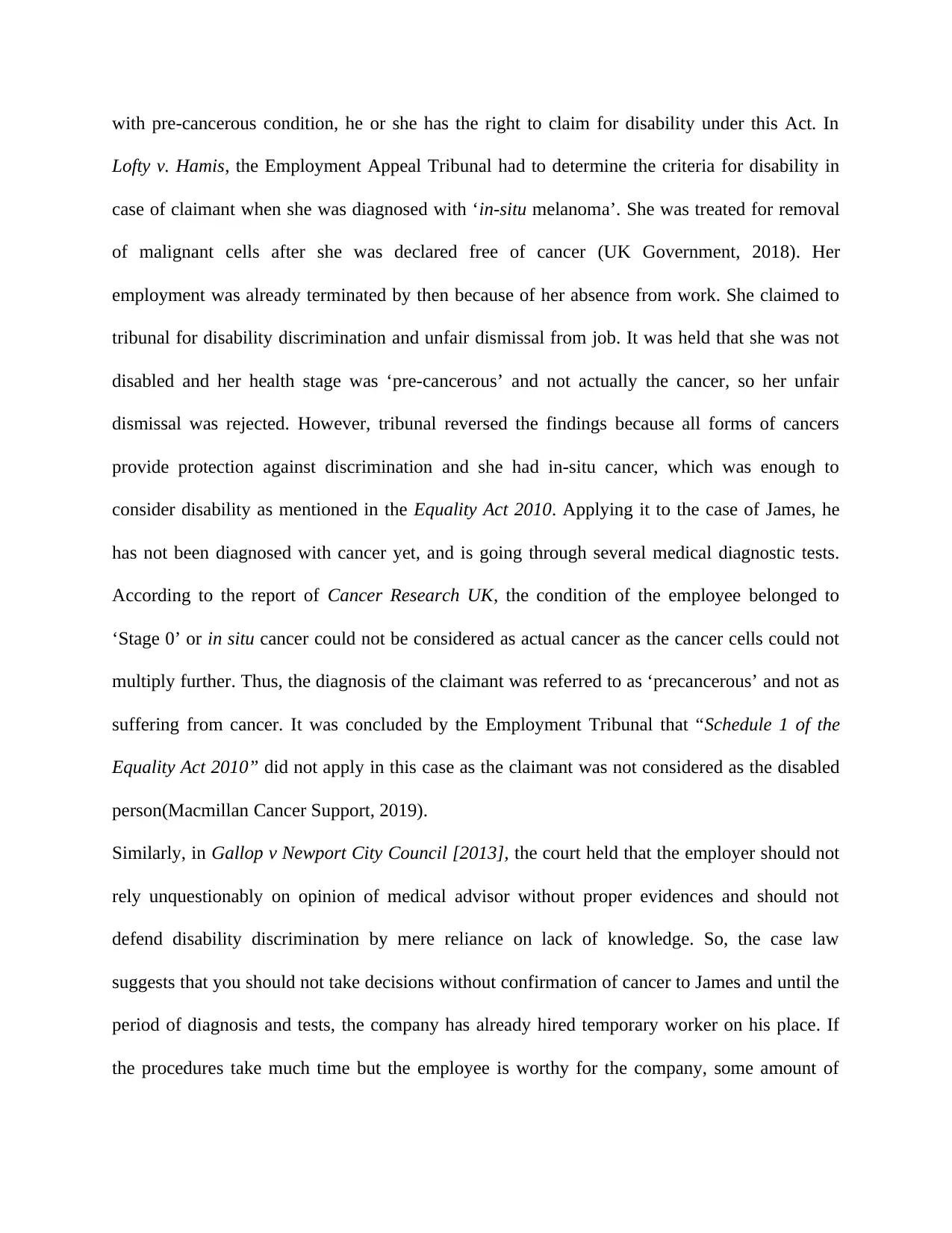
with pre-cancerous condition, he or she has the right to claim for disability under this Act. In
Lofty v. Hamis, the Employment Appeal Tribunal had to determine the criteria for disability in
case of claimant when she was diagnosed with ‘in-situ melanoma’. She was treated for removal
of malignant cells after she was declared free of cancer (UK Government, 2018). Her
employment was already terminated by then because of her absence from work. She claimed to
tribunal for disability discrimination and unfair dismissal from job. It was held that she was not
disabled and her health stage was ‘pre-cancerous’ and not actually the cancer, so her unfair
dismissal was rejected. However, tribunal reversed the findings because all forms of cancers
provide protection against discrimination and she had in-situ cancer, which was enough to
consider disability as mentioned in the Equality Act 2010. Applying it to the case of James, he
has not been diagnosed with cancer yet, and is going through several medical diagnostic tests.
According to the report of Cancer Research UK, the condition of the employee belonged to
‘Stage 0’ or in situ cancer could not be considered as actual cancer as the cancer cells could not
multiply further. Thus, the diagnosis of the claimant was referred to as ‘precancerous’ and not as
suffering from cancer. It was concluded by the Employment Tribunal that “Schedule 1 of the
Equality Act 2010” did not apply in this case as the claimant was not considered as the disabled
person(Macmillan Cancer Support, 2019).
Similarly, in Gallop v Newport City Council [2013], the court held that the employer should not
rely unquestionably on opinion of medical advisor without proper evidences and should not
defend disability discrimination by mere reliance on lack of knowledge. So, the case law
suggests that you should not take decisions without confirmation of cancer to James and until the
period of diagnosis and tests, the company has already hired temporary worker on his place. If
the procedures take much time but the employee is worthy for the company, some amount of
Lofty v. Hamis, the Employment Appeal Tribunal had to determine the criteria for disability in
case of claimant when she was diagnosed with ‘in-situ melanoma’. She was treated for removal
of malignant cells after she was declared free of cancer (UK Government, 2018). Her
employment was already terminated by then because of her absence from work. She claimed to
tribunal for disability discrimination and unfair dismissal from job. It was held that she was not
disabled and her health stage was ‘pre-cancerous’ and not actually the cancer, so her unfair
dismissal was rejected. However, tribunal reversed the findings because all forms of cancers
provide protection against discrimination and she had in-situ cancer, which was enough to
consider disability as mentioned in the Equality Act 2010. Applying it to the case of James, he
has not been diagnosed with cancer yet, and is going through several medical diagnostic tests.
According to the report of Cancer Research UK, the condition of the employee belonged to
‘Stage 0’ or in situ cancer could not be considered as actual cancer as the cancer cells could not
multiply further. Thus, the diagnosis of the claimant was referred to as ‘precancerous’ and not as
suffering from cancer. It was concluded by the Employment Tribunal that “Schedule 1 of the
Equality Act 2010” did not apply in this case as the claimant was not considered as the disabled
person(Macmillan Cancer Support, 2019).
Similarly, in Gallop v Newport City Council [2013], the court held that the employer should not
rely unquestionably on opinion of medical advisor without proper evidences and should not
defend disability discrimination by mere reliance on lack of knowledge. So, the case law
suggests that you should not take decisions without confirmation of cancer to James and until the
period of diagnosis and tests, the company has already hired temporary worker on his place. If
the procedures take much time but the employee is worthy for the company, some amount of
⊘ This is a preview!⊘
Do you want full access?
Subscribe today to unlock all pages.

Trusted by 1+ million students worldwide
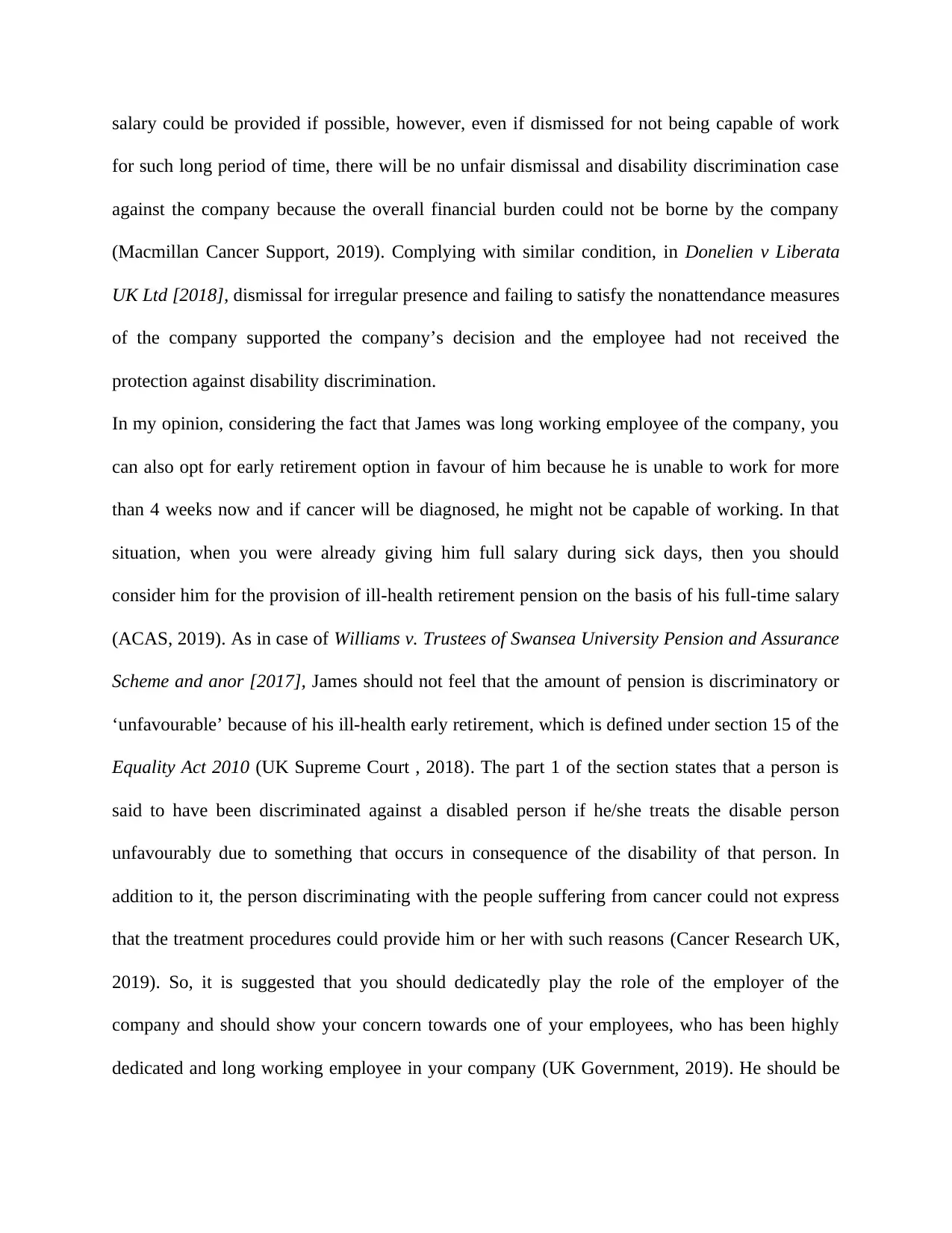
salary could be provided if possible, however, even if dismissed for not being capable of work
for such long period of time, there will be no unfair dismissal and disability discrimination case
against the company because the overall financial burden could not be borne by the company
(Macmillan Cancer Support, 2019). Complying with similar condition, in Donelien v Liberata
UK Ltd [2018], dismissal for irregular presence and failing to satisfy the nonattendance measures
of the company supported the company’s decision and the employee had not received the
protection against disability discrimination.
In my opinion, considering the fact that James was long working employee of the company, you
can also opt for early retirement option in favour of him because he is unable to work for more
than 4 weeks now and if cancer will be diagnosed, he might not be capable of working. In that
situation, when you were already giving him full salary during sick days, then you should
consider him for the provision of ill-health retirement pension on the basis of his full-time salary
(ACAS, 2019). As in case of Williams v. Trustees of Swansea University Pension and Assurance
Scheme and anor [2017], James should not feel that the amount of pension is discriminatory or
‘unfavourable’ because of his ill-health early retirement, which is defined under section 15 of the
Equality Act 2010 (UK Supreme Court , 2018). The part 1 of the section states that a person is
said to have been discriminated against a disabled person if he/she treats the disable person
unfavourably due to something that occurs in consequence of the disability of that person. In
addition to it, the person discriminating with the people suffering from cancer could not express
that the treatment procedures could provide him or her with such reasons (Cancer Research UK,
2019). So, it is suggested that you should dedicatedly play the role of the employer of the
company and should show your concern towards one of your employees, who has been highly
dedicated and long working employee in your company (UK Government, 2019). He should be
for such long period of time, there will be no unfair dismissal and disability discrimination case
against the company because the overall financial burden could not be borne by the company
(Macmillan Cancer Support, 2019). Complying with similar condition, in Donelien v Liberata
UK Ltd [2018], dismissal for irregular presence and failing to satisfy the nonattendance measures
of the company supported the company’s decision and the employee had not received the
protection against disability discrimination.
In my opinion, considering the fact that James was long working employee of the company, you
can also opt for early retirement option in favour of him because he is unable to work for more
than 4 weeks now and if cancer will be diagnosed, he might not be capable of working. In that
situation, when you were already giving him full salary during sick days, then you should
consider him for the provision of ill-health retirement pension on the basis of his full-time salary
(ACAS, 2019). As in case of Williams v. Trustees of Swansea University Pension and Assurance
Scheme and anor [2017], James should not feel that the amount of pension is discriminatory or
‘unfavourable’ because of his ill-health early retirement, which is defined under section 15 of the
Equality Act 2010 (UK Supreme Court , 2018). The part 1 of the section states that a person is
said to have been discriminated against a disabled person if he/she treats the disable person
unfavourably due to something that occurs in consequence of the disability of that person. In
addition to it, the person discriminating with the people suffering from cancer could not express
that the treatment procedures could provide him or her with such reasons (Cancer Research UK,
2019). So, it is suggested that you should dedicatedly play the role of the employer of the
company and should show your concern towards one of your employees, who has been highly
dedicated and long working employee in your company (UK Government, 2019). He should be
Paraphrase This Document
Need a fresh take? Get an instant paraphrase of this document with our AI Paraphraser
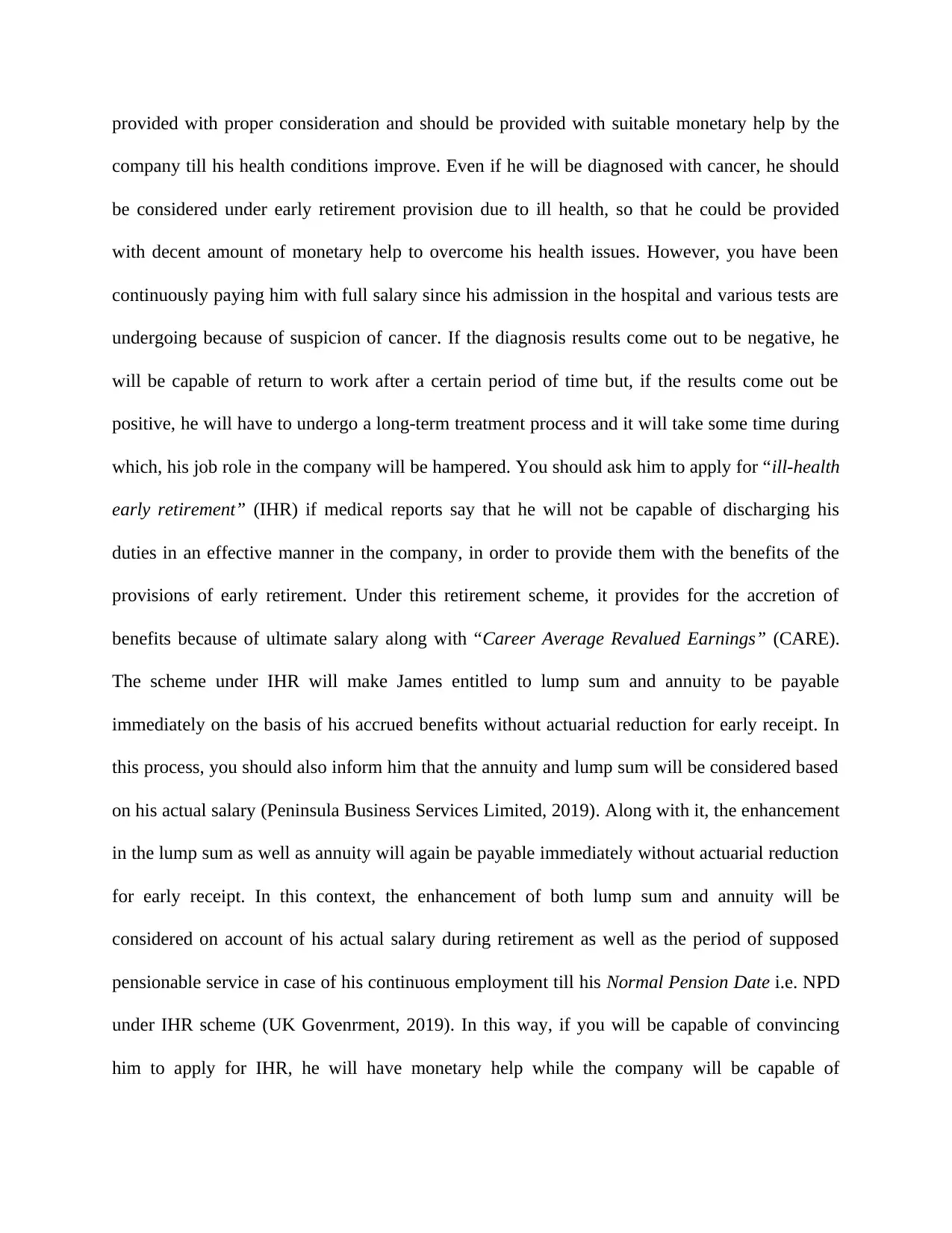
provided with proper consideration and should be provided with suitable monetary help by the
company till his health conditions improve. Even if he will be diagnosed with cancer, he should
be considered under early retirement provision due to ill health, so that he could be provided
with decent amount of monetary help to overcome his health issues. However, you have been
continuously paying him with full salary since his admission in the hospital and various tests are
undergoing because of suspicion of cancer. If the diagnosis results come out to be negative, he
will be capable of return to work after a certain period of time but, if the results come out be
positive, he will have to undergo a long-term treatment process and it will take some time during
which, his job role in the company will be hampered. You should ask him to apply for “ill-health
early retirement” (IHR) if medical reports say that he will not be capable of discharging his
duties in an effective manner in the company, in order to provide them with the benefits of the
provisions of early retirement. Under this retirement scheme, it provides for the accretion of
benefits because of ultimate salary along with “Career Average Revalued Earnings” (CARE).
The scheme under IHR will make James entitled to lump sum and annuity to be payable
immediately on the basis of his accrued benefits without actuarial reduction for early receipt. In
this process, you should also inform him that the annuity and lump sum will be considered based
on his actual salary (Peninsula Business Services Limited, 2019). Along with it, the enhancement
in the lump sum as well as annuity will again be payable immediately without actuarial reduction
for early receipt. In this context, the enhancement of both lump sum and annuity will be
considered on account of his actual salary during retirement as well as the period of supposed
pensionable service in case of his continuous employment till his Normal Pension Date i.e. NPD
under IHR scheme (UK Govenrment, 2019). In this way, if you will be capable of convincing
him to apply for IHR, he will have monetary help while the company will be capable of
company till his health conditions improve. Even if he will be diagnosed with cancer, he should
be considered under early retirement provision due to ill health, so that he could be provided
with decent amount of monetary help to overcome his health issues. However, you have been
continuously paying him with full salary since his admission in the hospital and various tests are
undergoing because of suspicion of cancer. If the diagnosis results come out to be negative, he
will be capable of return to work after a certain period of time but, if the results come out be
positive, he will have to undergo a long-term treatment process and it will take some time during
which, his job role in the company will be hampered. You should ask him to apply for “ill-health
early retirement” (IHR) if medical reports say that he will not be capable of discharging his
duties in an effective manner in the company, in order to provide them with the benefits of the
provisions of early retirement. Under this retirement scheme, it provides for the accretion of
benefits because of ultimate salary along with “Career Average Revalued Earnings” (CARE).
The scheme under IHR will make James entitled to lump sum and annuity to be payable
immediately on the basis of his accrued benefits without actuarial reduction for early receipt. In
this process, you should also inform him that the annuity and lump sum will be considered based
on his actual salary (Peninsula Business Services Limited, 2019). Along with it, the enhancement
in the lump sum as well as annuity will again be payable immediately without actuarial reduction
for early receipt. In this context, the enhancement of both lump sum and annuity will be
considered on account of his actual salary during retirement as well as the period of supposed
pensionable service in case of his continuous employment till his Normal Pension Date i.e. NPD
under IHR scheme (UK Govenrment, 2019). In this way, if you will be capable of convincing
him to apply for IHR, he will have monetary help while the company will be capable of
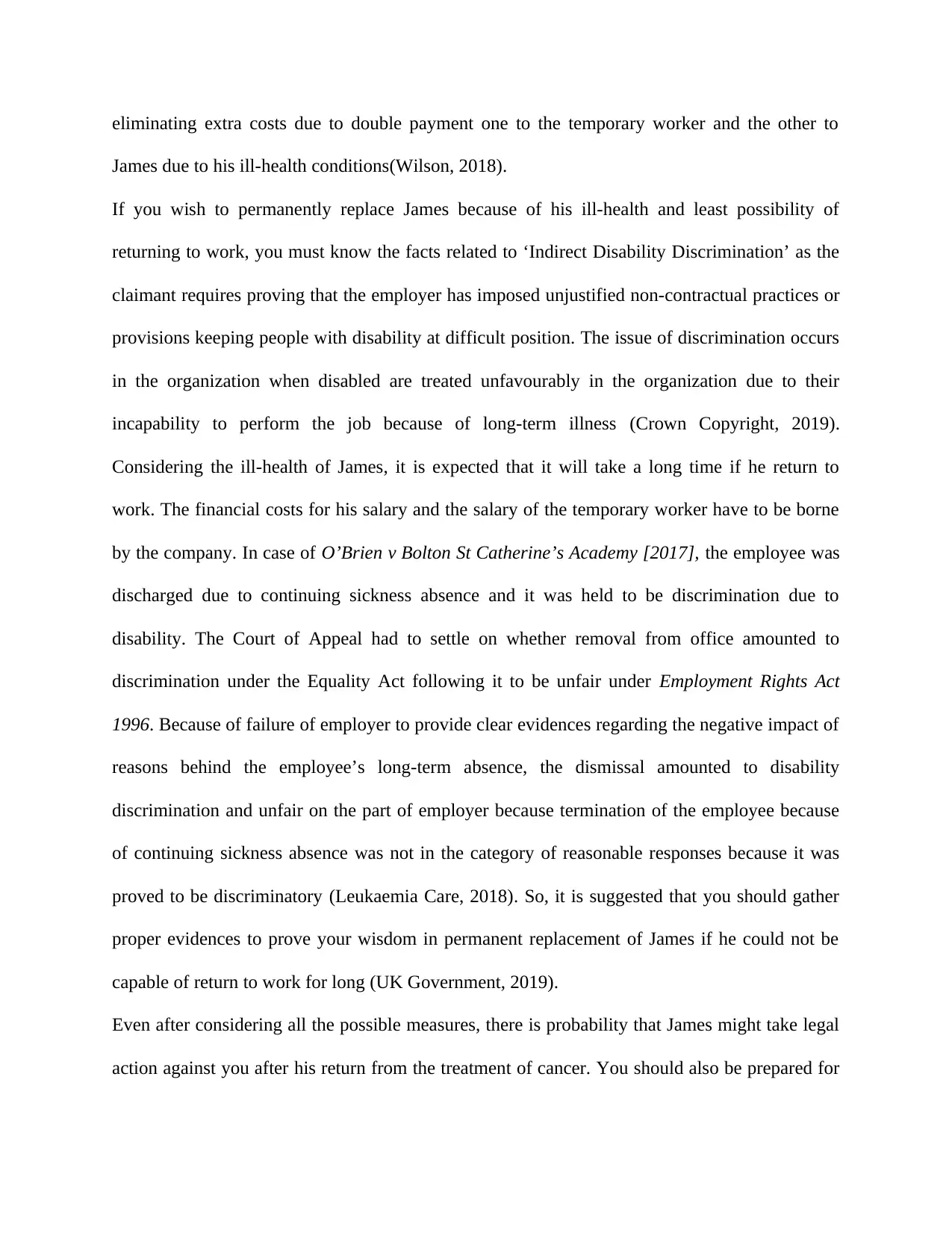
eliminating extra costs due to double payment one to the temporary worker and the other to
James due to his ill-health conditions(Wilson, 2018).
If you wish to permanently replace James because of his ill-health and least possibility of
returning to work, you must know the facts related to ‘Indirect Disability Discrimination’ as the
claimant requires proving that the employer has imposed unjustified non-contractual practices or
provisions keeping people with disability at difficult position. The issue of discrimination occurs
in the organization when disabled are treated unfavourably in the organization due to their
incapability to perform the job because of long-term illness (Crown Copyright, 2019).
Considering the ill-health of James, it is expected that it will take a long time if he return to
work. The financial costs for his salary and the salary of the temporary worker have to be borne
by the company. In case of O’Brien v Bolton St Catherine’s Academy [2017], the employee was
discharged due to continuing sickness absence and it was held to be discrimination due to
disability. The Court of Appeal had to settle on whether removal from office amounted to
discrimination under the Equality Act following it to be unfair under Employment Rights Act
1996. Because of failure of employer to provide clear evidences regarding the negative impact of
reasons behind the employee’s long-term absence, the dismissal amounted to disability
discrimination and unfair on the part of employer because termination of the employee because
of continuing sickness absence was not in the category of reasonable responses because it was
proved to be discriminatory (Leukaemia Care, 2018). So, it is suggested that you should gather
proper evidences to prove your wisdom in permanent replacement of James if he could not be
capable of return to work for long (UK Government, 2019).
Even after considering all the possible measures, there is probability that James might take legal
action against you after his return from the treatment of cancer. You should also be prepared for
James due to his ill-health conditions(Wilson, 2018).
If you wish to permanently replace James because of his ill-health and least possibility of
returning to work, you must know the facts related to ‘Indirect Disability Discrimination’ as the
claimant requires proving that the employer has imposed unjustified non-contractual practices or
provisions keeping people with disability at difficult position. The issue of discrimination occurs
in the organization when disabled are treated unfavourably in the organization due to their
incapability to perform the job because of long-term illness (Crown Copyright, 2019).
Considering the ill-health of James, it is expected that it will take a long time if he return to
work. The financial costs for his salary and the salary of the temporary worker have to be borne
by the company. In case of O’Brien v Bolton St Catherine’s Academy [2017], the employee was
discharged due to continuing sickness absence and it was held to be discrimination due to
disability. The Court of Appeal had to settle on whether removal from office amounted to
discrimination under the Equality Act following it to be unfair under Employment Rights Act
1996. Because of failure of employer to provide clear evidences regarding the negative impact of
reasons behind the employee’s long-term absence, the dismissal amounted to disability
discrimination and unfair on the part of employer because termination of the employee because
of continuing sickness absence was not in the category of reasonable responses because it was
proved to be discriminatory (Leukaemia Care, 2018). So, it is suggested that you should gather
proper evidences to prove your wisdom in permanent replacement of James if he could not be
capable of return to work for long (UK Government, 2019).
Even after considering all the possible measures, there is probability that James might take legal
action against you after his return from the treatment of cancer. You should also be prepared for
⊘ This is a preview!⊘
Do you want full access?
Subscribe today to unlock all pages.

Trusted by 1+ million students worldwide
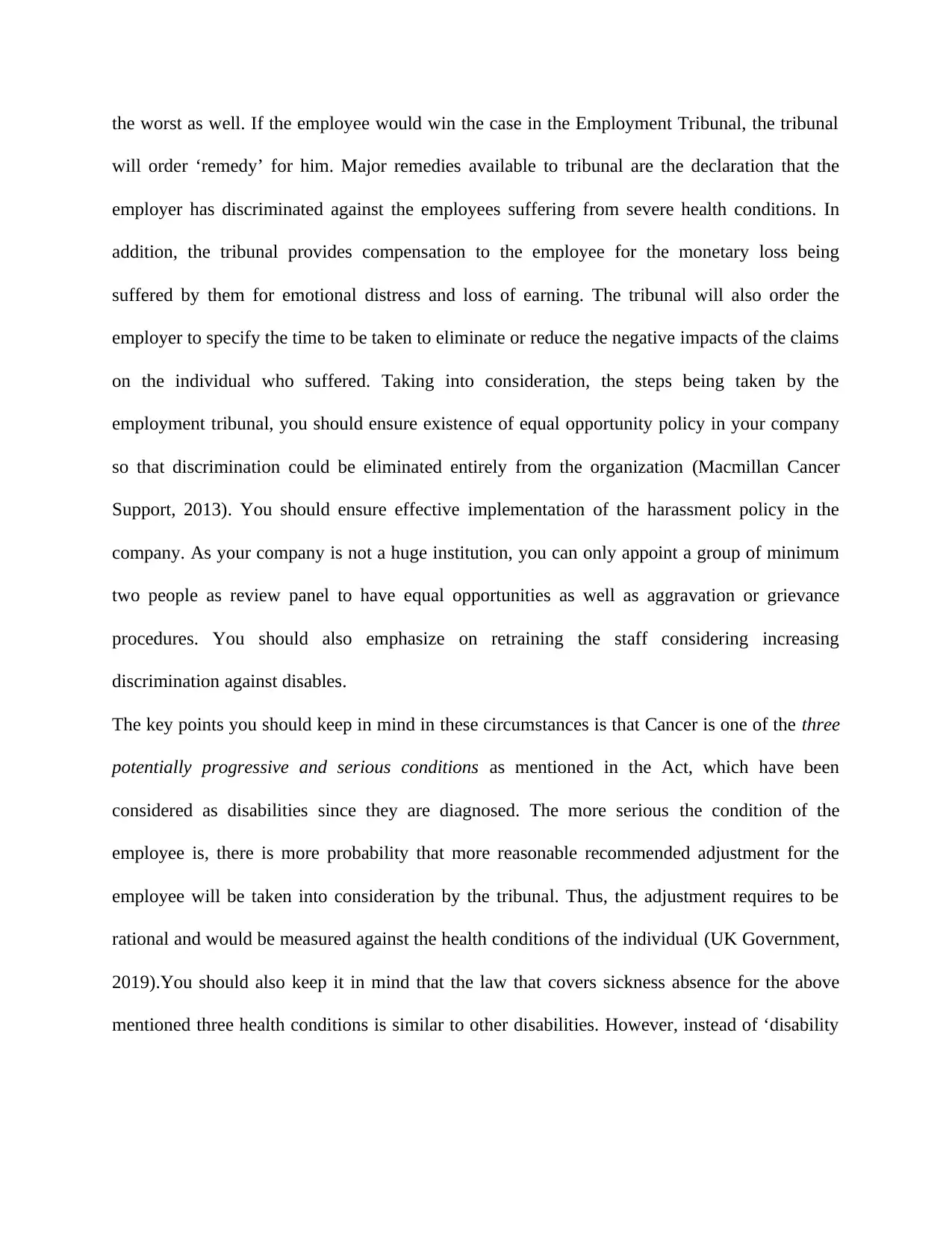
the worst as well. If the employee would win the case in the Employment Tribunal, the tribunal
will order ‘remedy’ for him. Major remedies available to tribunal are the declaration that the
employer has discriminated against the employees suffering from severe health conditions. In
addition, the tribunal provides compensation to the employee for the monetary loss being
suffered by them for emotional distress and loss of earning. The tribunal will also order the
employer to specify the time to be taken to eliminate or reduce the negative impacts of the claims
on the individual who suffered. Taking into consideration, the steps being taken by the
employment tribunal, you should ensure existence of equal opportunity policy in your company
so that discrimination could be eliminated entirely from the organization (Macmillan Cancer
Support, 2013). You should ensure effective implementation of the harassment policy in the
company. As your company is not a huge institution, you can only appoint a group of minimum
two people as review panel to have equal opportunities as well as aggravation or grievance
procedures. You should also emphasize on retraining the staff considering increasing
discrimination against disables.
The key points you should keep in mind in these circumstances is that Cancer is one of the three
potentially progressive and serious conditions as mentioned in the Act, which have been
considered as disabilities since they are diagnosed. The more serious the condition of the
employee is, there is more probability that more reasonable recommended adjustment for the
employee will be taken into consideration by the tribunal. Thus, the adjustment requires to be
rational and would be measured against the health conditions of the individual (UK Government,
2019).You should also keep it in mind that the law that covers sickness absence for the above
mentioned three health conditions is similar to other disabilities. However, instead of ‘disability
will order ‘remedy’ for him. Major remedies available to tribunal are the declaration that the
employer has discriminated against the employees suffering from severe health conditions. In
addition, the tribunal provides compensation to the employee for the monetary loss being
suffered by them for emotional distress and loss of earning. The tribunal will also order the
employer to specify the time to be taken to eliminate or reduce the negative impacts of the claims
on the individual who suffered. Taking into consideration, the steps being taken by the
employment tribunal, you should ensure existence of equal opportunity policy in your company
so that discrimination could be eliminated entirely from the organization (Macmillan Cancer
Support, 2013). You should ensure effective implementation of the harassment policy in the
company. As your company is not a huge institution, you can only appoint a group of minimum
two people as review panel to have equal opportunities as well as aggravation or grievance
procedures. You should also emphasize on retraining the staff considering increasing
discrimination against disables.
The key points you should keep in mind in these circumstances is that Cancer is one of the three
potentially progressive and serious conditions as mentioned in the Act, which have been
considered as disabilities since they are diagnosed. The more serious the condition of the
employee is, there is more probability that more reasonable recommended adjustment for the
employee will be taken into consideration by the tribunal. Thus, the adjustment requires to be
rational and would be measured against the health conditions of the individual (UK Government,
2019).You should also keep it in mind that the law that covers sickness absence for the above
mentioned three health conditions is similar to other disabilities. However, instead of ‘disability
Paraphrase This Document
Need a fresh take? Get an instant paraphrase of this document with our AI Paraphraser
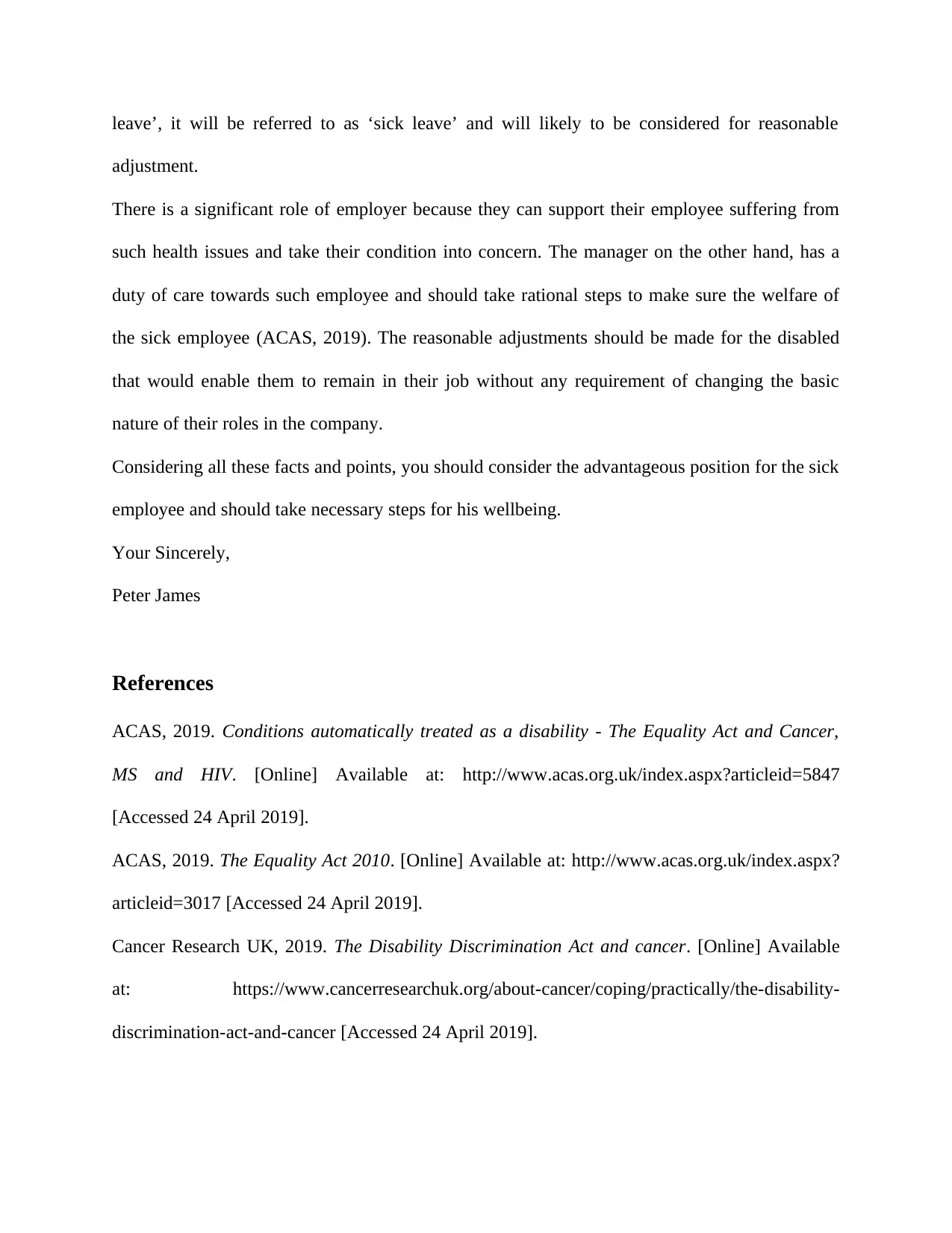
leave’, it will be referred to as ‘sick leave’ and will likely to be considered for reasonable
adjustment.
There is a significant role of employer because they can support their employee suffering from
such health issues and take their condition into concern. The manager on the other hand, has a
duty of care towards such employee and should take rational steps to make sure the welfare of
the sick employee (ACAS, 2019). The reasonable adjustments should be made for the disabled
that would enable them to remain in their job without any requirement of changing the basic
nature of their roles in the company.
Considering all these facts and points, you should consider the advantageous position for the sick
employee and should take necessary steps for his wellbeing.
Your Sincerely,
Peter James
References
ACAS, 2019. Conditions automatically treated as a disability - The Equality Act and Cancer,
MS and HIV. [Online] Available at: http://www.acas.org.uk/index.aspx?articleid=5847
[Accessed 24 April 2019].
ACAS, 2019. The Equality Act 2010. [Online] Available at: http://www.acas.org.uk/index.aspx?
articleid=3017 [Accessed 24 April 2019].
Cancer Research UK, 2019. The Disability Discrimination Act and cancer. [Online] Available
at: https://www.cancerresearchuk.org/about-cancer/coping/practically/the-disability-
discrimination-act-and-cancer [Accessed 24 April 2019].
adjustment.
There is a significant role of employer because they can support their employee suffering from
such health issues and take their condition into concern. The manager on the other hand, has a
duty of care towards such employee and should take rational steps to make sure the welfare of
the sick employee (ACAS, 2019). The reasonable adjustments should be made for the disabled
that would enable them to remain in their job without any requirement of changing the basic
nature of their roles in the company.
Considering all these facts and points, you should consider the advantageous position for the sick
employee and should take necessary steps for his wellbeing.
Your Sincerely,
Peter James
References
ACAS, 2019. Conditions automatically treated as a disability - The Equality Act and Cancer,
MS and HIV. [Online] Available at: http://www.acas.org.uk/index.aspx?articleid=5847
[Accessed 24 April 2019].
ACAS, 2019. The Equality Act 2010. [Online] Available at: http://www.acas.org.uk/index.aspx?
articleid=3017 [Accessed 24 April 2019].
Cancer Research UK, 2019. The Disability Discrimination Act and cancer. [Online] Available
at: https://www.cancerresearchuk.org/about-cancer/coping/practically/the-disability-
discrimination-act-and-cancer [Accessed 24 April 2019].
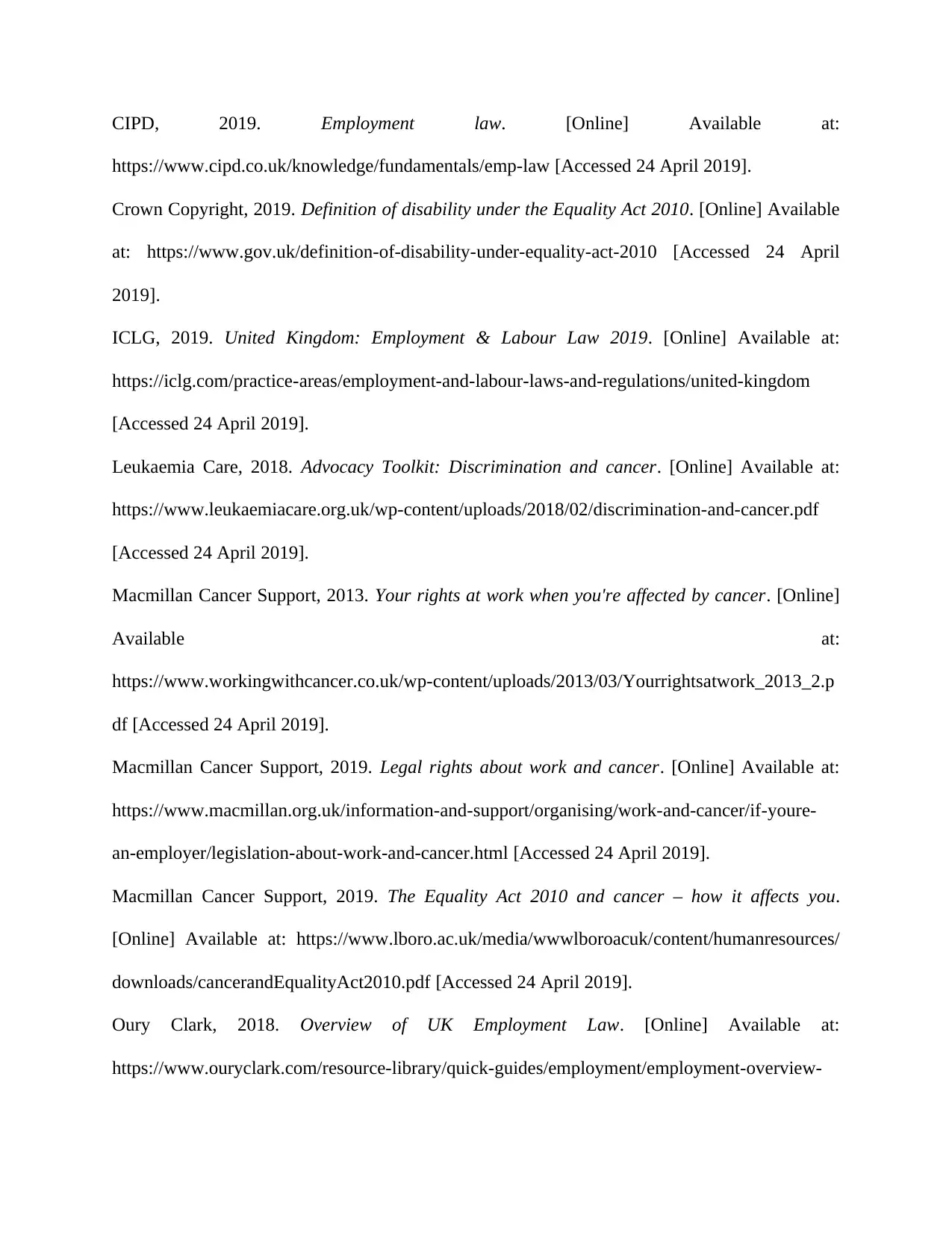
CIPD, 2019. Employment law. [Online] Available at:
https://www.cipd.co.uk/knowledge/fundamentals/emp-law [Accessed 24 April 2019].
Crown Copyright, 2019. Definition of disability under the Equality Act 2010. [Online] Available
at: https://www.gov.uk/definition-of-disability-under-equality-act-2010 [Accessed 24 April
2019].
ICLG, 2019. United Kingdom: Employment & Labour Law 2019. [Online] Available at:
https://iclg.com/practice-areas/employment-and-labour-laws-and-regulations/united-kingdom
[Accessed 24 April 2019].
Leukaemia Care, 2018. Advocacy Toolkit: Discrimination and cancer. [Online] Available at:
https://www.leukaemiacare.org.uk/wp-content/uploads/2018/02/discrimination-and-cancer.pdf
[Accessed 24 April 2019].
Macmillan Cancer Support, 2013. Your rights at work when you're affected by cancer. [Online]
Available at:
https://www.workingwithcancer.co.uk/wp-content/uploads/2013/03/Yourrightsatwork_2013_2.p
df [Accessed 24 April 2019].
Macmillan Cancer Support, 2019. Legal rights about work and cancer. [Online] Available at:
https://www.macmillan.org.uk/information-and-support/organising/work-and-cancer/if-youre-
an-employer/legislation-about-work-and-cancer.html [Accessed 24 April 2019].
Macmillan Cancer Support, 2019. The Equality Act 2010 and cancer – how it affects you.
[Online] Available at: https://www.lboro.ac.uk/media/wwwlboroacuk/content/humanresources/
downloads/cancerandEqualityAct2010.pdf [Accessed 24 April 2019].
Oury Clark, 2018. Overview of UK Employment Law. [Online] Available at:
https://www.ouryclark.com/resource-library/quick-guides/employment/employment-overview-
https://www.cipd.co.uk/knowledge/fundamentals/emp-law [Accessed 24 April 2019].
Crown Copyright, 2019. Definition of disability under the Equality Act 2010. [Online] Available
at: https://www.gov.uk/definition-of-disability-under-equality-act-2010 [Accessed 24 April
2019].
ICLG, 2019. United Kingdom: Employment & Labour Law 2019. [Online] Available at:
https://iclg.com/practice-areas/employment-and-labour-laws-and-regulations/united-kingdom
[Accessed 24 April 2019].
Leukaemia Care, 2018. Advocacy Toolkit: Discrimination and cancer. [Online] Available at:
https://www.leukaemiacare.org.uk/wp-content/uploads/2018/02/discrimination-and-cancer.pdf
[Accessed 24 April 2019].
Macmillan Cancer Support, 2013. Your rights at work when you're affected by cancer. [Online]
Available at:
https://www.workingwithcancer.co.uk/wp-content/uploads/2013/03/Yourrightsatwork_2013_2.p
df [Accessed 24 April 2019].
Macmillan Cancer Support, 2019. Legal rights about work and cancer. [Online] Available at:
https://www.macmillan.org.uk/information-and-support/organising/work-and-cancer/if-youre-
an-employer/legislation-about-work-and-cancer.html [Accessed 24 April 2019].
Macmillan Cancer Support, 2019. The Equality Act 2010 and cancer – how it affects you.
[Online] Available at: https://www.lboro.ac.uk/media/wwwlboroacuk/content/humanresources/
downloads/cancerandEqualityAct2010.pdf [Accessed 24 April 2019].
Oury Clark, 2018. Overview of UK Employment Law. [Online] Available at:
https://www.ouryclark.com/resource-library/quick-guides/employment/employment-overview-
⊘ This is a preview!⊘
Do you want full access?
Subscribe today to unlock all pages.

Trusted by 1+ million students worldwide
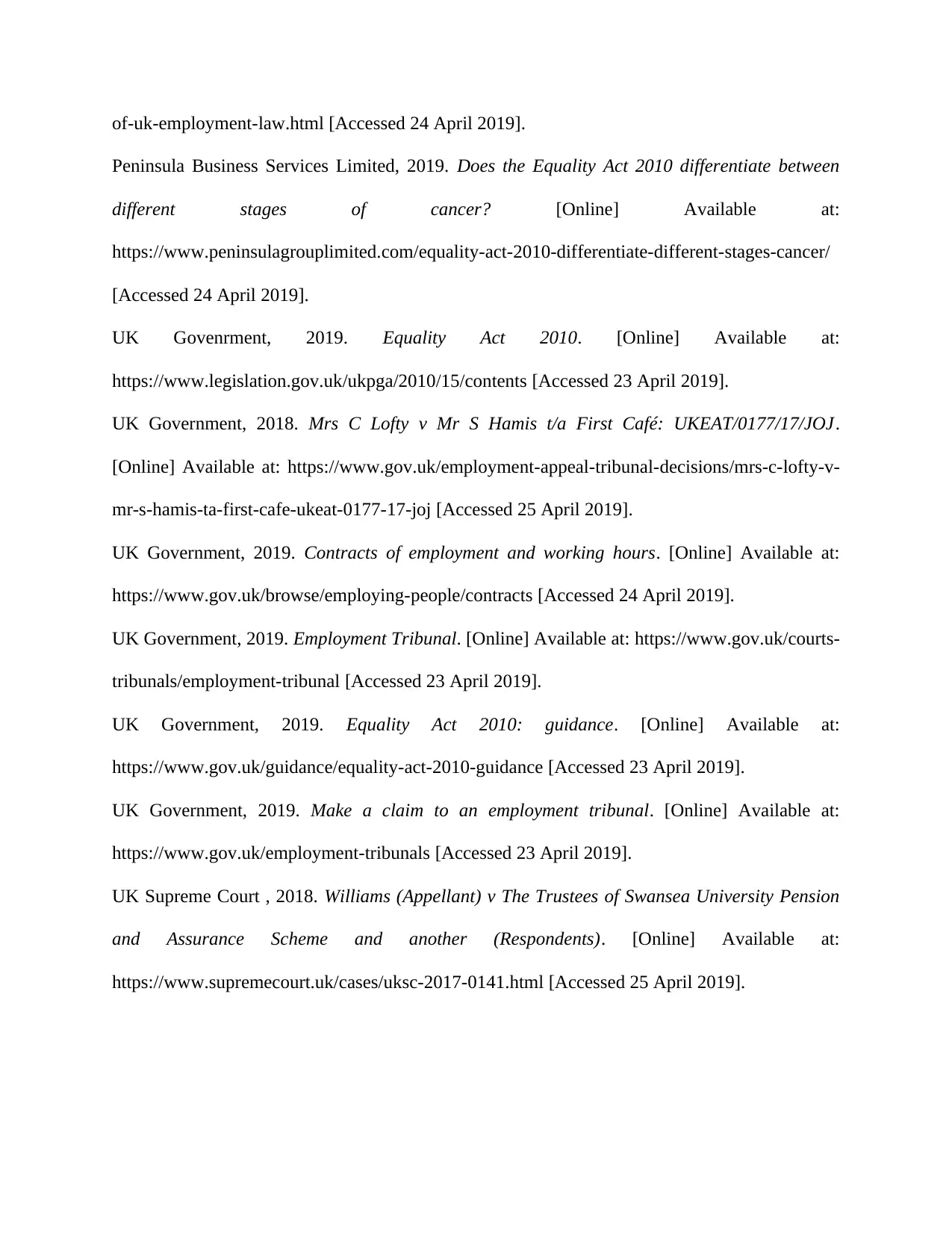
of-uk-employment-law.html [Accessed 24 April 2019].
Peninsula Business Services Limited, 2019. Does the Equality Act 2010 differentiate between
different stages of cancer? [Online] Available at:
https://www.peninsulagrouplimited.com/equality-act-2010-differentiate-different-stages-cancer/
[Accessed 24 April 2019].
UK Govenrment, 2019. Equality Act 2010. [Online] Available at:
https://www.legislation.gov.uk/ukpga/2010/15/contents [Accessed 23 April 2019].
UK Government, 2018. Mrs C Lofty v Mr S Hamis t/a First Café: UKEAT/0177/17/JOJ.
[Online] Available at: https://www.gov.uk/employment-appeal-tribunal-decisions/mrs-c-lofty-v-
mr-s-hamis-ta-first-cafe-ukeat-0177-17-joj [Accessed 25 April 2019].
UK Government, 2019. Contracts of employment and working hours. [Online] Available at:
https://www.gov.uk/browse/employing-people/contracts [Accessed 24 April 2019].
UK Government, 2019. Employment Tribunal. [Online] Available at: https://www.gov.uk/courts-
tribunals/employment-tribunal [Accessed 23 April 2019].
UK Government, 2019. Equality Act 2010: guidance. [Online] Available at:
https://www.gov.uk/guidance/equality-act-2010-guidance [Accessed 23 April 2019].
UK Government, 2019. Make a claim to an employment tribunal. [Online] Available at:
https://www.gov.uk/employment-tribunals [Accessed 23 April 2019].
UK Supreme Court , 2018. Williams (Appellant) v The Trustees of Swansea University Pension
and Assurance Scheme and another (Respondents). [Online] Available at:
https://www.supremecourt.uk/cases/uksc-2017-0141.html [Accessed 25 April 2019].
Peninsula Business Services Limited, 2019. Does the Equality Act 2010 differentiate between
different stages of cancer? [Online] Available at:
https://www.peninsulagrouplimited.com/equality-act-2010-differentiate-different-stages-cancer/
[Accessed 24 April 2019].
UK Govenrment, 2019. Equality Act 2010. [Online] Available at:
https://www.legislation.gov.uk/ukpga/2010/15/contents [Accessed 23 April 2019].
UK Government, 2018. Mrs C Lofty v Mr S Hamis t/a First Café: UKEAT/0177/17/JOJ.
[Online] Available at: https://www.gov.uk/employment-appeal-tribunal-decisions/mrs-c-lofty-v-
mr-s-hamis-ta-first-cafe-ukeat-0177-17-joj [Accessed 25 April 2019].
UK Government, 2019. Contracts of employment and working hours. [Online] Available at:
https://www.gov.uk/browse/employing-people/contracts [Accessed 24 April 2019].
UK Government, 2019. Employment Tribunal. [Online] Available at: https://www.gov.uk/courts-
tribunals/employment-tribunal [Accessed 23 April 2019].
UK Government, 2019. Equality Act 2010: guidance. [Online] Available at:
https://www.gov.uk/guidance/equality-act-2010-guidance [Accessed 23 April 2019].
UK Government, 2019. Make a claim to an employment tribunal. [Online] Available at:
https://www.gov.uk/employment-tribunals [Accessed 23 April 2019].
UK Supreme Court , 2018. Williams (Appellant) v The Trustees of Swansea University Pension
and Assurance Scheme and another (Respondents). [Online] Available at:
https://www.supremecourt.uk/cases/uksc-2017-0141.html [Accessed 25 April 2019].
Paraphrase This Document
Need a fresh take? Get an instant paraphrase of this document with our AI Paraphraser

Wilson, L., 2018. When is cancer protected under the Equality Act 2010? [Online] Available at:
http://www.macdonaldoates.co.uk/2018/03/14/cancer-protected-equality-act-2010/ [Accessed 24
April 2019].
http://www.macdonaldoates.co.uk/2018/03/14/cancer-protected-equality-act-2010/ [Accessed 24
April 2019].
1 out of 11
Related Documents
Your All-in-One AI-Powered Toolkit for Academic Success.
+13062052269
info@desklib.com
Available 24*7 on WhatsApp / Email
![[object Object]](/_next/static/media/star-bottom.7253800d.svg)
Unlock your academic potential
Copyright © 2020–2026 A2Z Services. All Rights Reserved. Developed and managed by ZUCOL.

